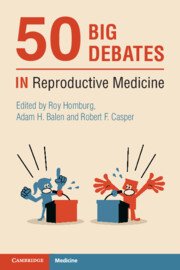Book contents
- 50 Big Debates in Reproductive Medicine
- Series page
- 50 Big Debates in Reproductive Medicine
- Copyright page
- Contents
- Contributors
- Foreword
- Introduction
- Section I Limits for IVF
- Section II IVF Add-ons
- Section III The Best Policy
- Section IV Embryology
- 24A ICSI Should Be Used for All IVF Cycles
- 24B ICSI Should Be Used for All IVF Cycles
- 25A Embryo Morphokinetic Analysis (Time-Lapse Imaging) Is Helpful in Selecting Euploid Blastocysts
- 25B Embryo Morphokinetic Analysis (Time-Lapse Imaging) Is Helpful in Selecting Euploid Blastocysts
- 26A Time-Lapse Imaging Should Be a Routine Procedure in Clinical Embryology
- 26B Time-Lapse Imaging Should Be a Routine Procedure in Clinical Embryology
- 27A Artificial Intelligence Is Useful for Embryo Selection in IVF
- 27B Artificial Intelligence Is Useful for Embryo Selection in IVF
- 28A There Is No Need to Take Embryos Out of the Incubator until the Day of Embryo Transfer
- 28B There Is No Need to Take Embryos Out of the Incubator until the Day of Embryo Transfer
- 29A Blastocyst Culture Should Be a Routine in All IVF Cycles
- 29B Blastocyst Culture Should Be a Routine in All IVF Cycles
- Section V Ethics and Statistics
- Section VI Male-factor Infertility
- Section VII Genetics
- Section VIII Ovarian Stimulation
- Section IX Hormones and the Environment
- Index
- References
27B - Artificial Intelligence Is Useful for Embryo Selection in IVF
Against
from Section IV - Embryology
Published online by Cambridge University Press: 25 November 2021
- 50 Big Debates in Reproductive Medicine
- Series page
- 50 Big Debates in Reproductive Medicine
- Copyright page
- Contents
- Contributors
- Foreword
- Introduction
- Section I Limits for IVF
- Section II IVF Add-ons
- Section III The Best Policy
- Section IV Embryology
- 24A ICSI Should Be Used for All IVF Cycles
- 24B ICSI Should Be Used for All IVF Cycles
- 25A Embryo Morphokinetic Analysis (Time-Lapse Imaging) Is Helpful in Selecting Euploid Blastocysts
- 25B Embryo Morphokinetic Analysis (Time-Lapse Imaging) Is Helpful in Selecting Euploid Blastocysts
- 26A Time-Lapse Imaging Should Be a Routine Procedure in Clinical Embryology
- 26B Time-Lapse Imaging Should Be a Routine Procedure in Clinical Embryology
- 27A Artificial Intelligence Is Useful for Embryo Selection in IVF
- 27B Artificial Intelligence Is Useful for Embryo Selection in IVF
- 28A There Is No Need to Take Embryos Out of the Incubator until the Day of Embryo Transfer
- 28B There Is No Need to Take Embryos Out of the Incubator until the Day of Embryo Transfer
- 29A Blastocyst Culture Should Be a Routine in All IVF Cycles
- 29B Blastocyst Culture Should Be a Routine in All IVF Cycles
- Section V Ethics and Statistics
- Section VI Male-factor Infertility
- Section VII Genetics
- Section VIII Ovarian Stimulation
- Section IX Hormones and the Environment
- Index
- References
Summary
The use of Artificial Intelligence (AI) aims to revolutionise the way we work within the clinical IVF laboratory by offering invaluable assistance to the scientists selecting embryos for transfer. AI does this by removing the human operator from the process, allowing digital systems to feed on the data through a process called datamining. The AI system establishes artificial neural networks and essentially learns which embryo parameters are associated with desirable or undesirable outcomes (1). The aim is to accurately detect the viability of embryos and rank them according to their implantation potential, thus increasing confidence in single embryo transfer and time to pregnancy. By performing entirely objectively, with precise scrutiny and with a wealth of data not accessible to the scientist, this computerised approach is designed to outperform the embryologist. However, despite efforts to establish a firm place for AI during routine IVF, to date there is little evidence it will serve as a useful clinical tool. Although the non-invasive nature of AI appeals to professionals and patients as being seemingly harmless, the technology has multiple flaws that currently prevent its promotion to anything other than yet another useless and risky IVF ‘add-on’.
- Type
- Chapter
- Information
- 50 Big Debates in Reproductive Medicine , pp. 145 - 146Publisher: Cambridge University PressPrint publication year: 2021



